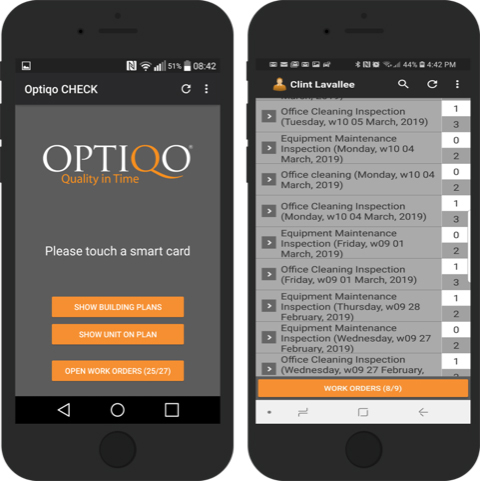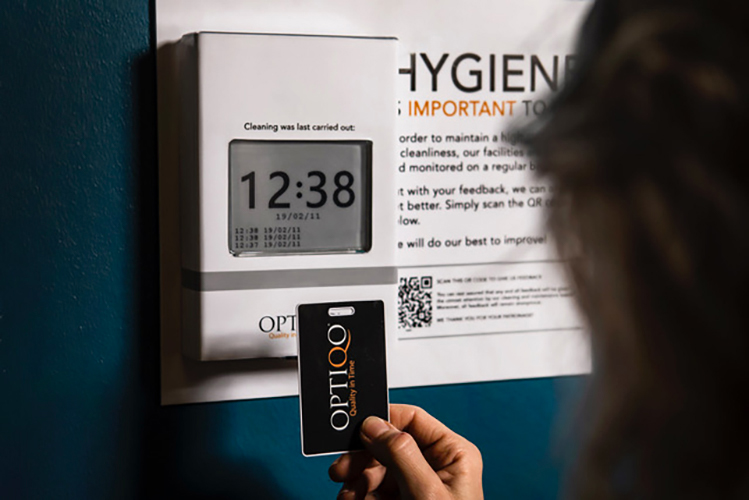An interview with Clint Lavallee, VP Sales and Operations, Optiqo. By Ross Falconer
Optiqo has a strong history within the commercial hygiene and cleaning/maintenance field, having representation in Canada, as well as industry expertise in Europe.
“Our primary focus is using the latest NFC technology to provide validation and inspection site data that touches on the cleaning protocols and frequencies based on Insta 800 and ISSA standards,” begins Clint Lavallee, VP Sales and Operations, Optiqo. “We offer additional technologies that provide the public with accurate and reliable data and allow their input to be integrated within our solutions.”
The COVID-19 pandemic has served to highlight the importance of Optiqo’s technologies, at a time when the air transport industry’s focus is on ensuring public confidence that it is safe to travel again.
Lavallee says people will return, if they feel that they are safe and that all efforts have been made to ensure their well-being. “Essentially, creating that level of security that outweighs the health risks.”
Optiqo’s applications can monitor which tasks are being completed by utilising the power of NFC technology. By integrating tasks within an NFC tag that is strategically placed in an aircraft, the carrier can validate when the aircraft was last cleaned, by who and where, as well as identifying when the tasks commenced and ended, and if all tasks were completed.

Clint Lavallee, VP Sales and Operations, Optiqo: “Through the use of our Optiqo Check application, tasks can be customised and modified via a centralised web portal and all changes would be applied immediately.”
“Through the use of our Optiqo Check application, tasks can be customised and modified via a centralised web portal and all changes would be applied immediately,” Lavallee explains. “Additionally, our Optiqo Insta solution offers the ability to process site inspections with regards to cleanliness, hygiene or other routine inspections that need to be applied within the aircraft. As such, the inspections are a validation that the cleaning crew task has indeed been performed.”
The idea behind the Insta inspection application is to validate and identify any anomalies. If, over time, the same red flags pop up at a certain airport, by a certain crew or individual, that will be identified in the historical data via the KPI dashboard tool. “In essence, the technology itself increases the success of the cleaning procedure. What gets measured, gets done,” Lavallee adds.
An NFC-based display identifies when the last cleaning took place on a specific aircraft. This is achieved once the cleaning crew scans the NFC tag to complete the registration of the cleaning requirements. By rescanning the NFC-based display, the screen will update the date and time to identify when the environment was last attended to.
“We can integrate customer feedback options whereby clients can scan the device and provide their comments relating to cleaning, maintenance and even missing inventory – soap, sanitiser, etc – that may be lacking on the aircraft. Of course, these feedback forms would be entirely customised for the carrier in question,” says Lavallee. “As such, I am confident that airports would greatly benefit from our technology since it will have an immediate and positive impact on the airports’ ultimate goal, which is to get the public flying again. Saying what you are doing is one thing; backing it up with accurate and verifiable data – that is essential at this stage.”
Creating a sense of confidence for the travelling public
The Optiqo Qlvr Box visualises the latest cleaning and also uses a sensor to measure visitor traffic. The traffic data can be analysed to optimise cleaning frequency, leading to lower cost and less environmental impact without reducing the quality of the cleaning.
“The initial feedback is based on the fact that the airports are prepping in advance, in order to create a sense of confidence for the travelling public when they return,” Lavallee explains. “As such, having these units in place will advise the public that their well-being is being taken seriously. Moreover, through the use of NFC, the management is now asking for validated data that all aspects of the cleaning procedures are being followed, which we can provide. They are also noticing that the cleanliness of the airport bathrooms is greatly improved since the staff is well aware that they are being monitored and, as such, the cleaning has improved exponentially.”

The Optiqo Qlvr Box visualises the latest cleaning and also uses a sensor to measure visitor traffic. The traffic data can be analysed to optimise cleaning frequency.
Interest in the Optiqo Qlvr Box has increased among North American airports as a result of COVID-19. Indeed, the airports that Optiqo is working with are looking to have the units in place as soon as possible. “They understand that these devices are ideal for the return of the travelling public,” says Lavallee.
He adds that simply being prepared to reopen by investing in Personal Protective Equipment (PPE), soap and other cleaning materials, does not address the primary challenge in today’s reality. “You need to create a sense of confidence for the public to believe that it is safe to enter your environment. To do that, you need to be transparent and back up your words with verifiable and actionable data. You can claim that you are cleaning on a regular basis, or let the public see when you are actually conducting your cleaning and allow them to communicate with you regarding any anomalies that may occur. That is where Optiqo stands out compared to any other vendor in this area.”







